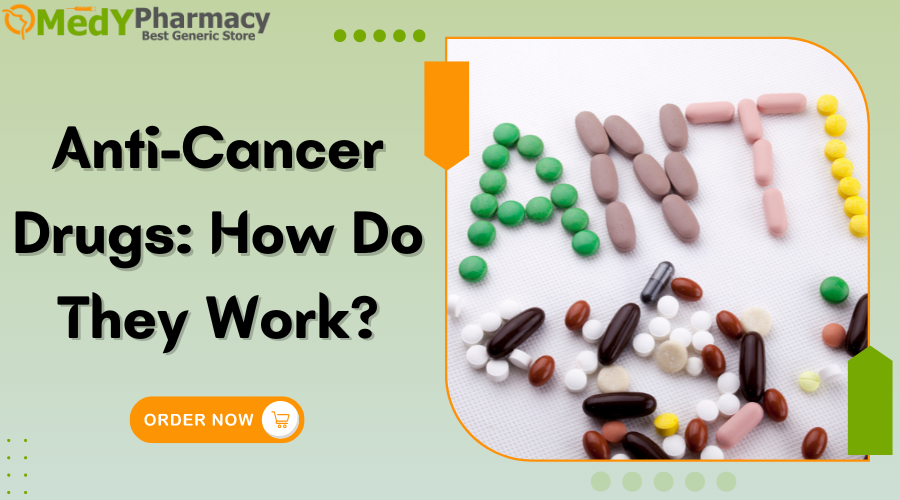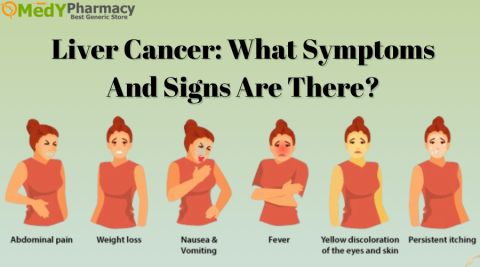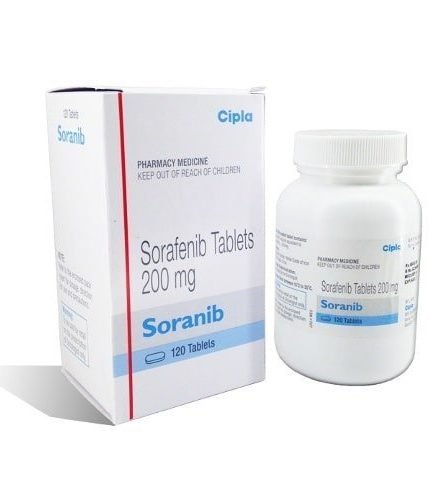Introduction:
Anti-cancer medications are those that are used to treat cancer. These drugs are intended to reduce or stop the spread of cancer by targeting the pathways involved in cancer cell growth and division.
Anti-cancer drugs are available in a variety of ways, including immunotherapy, endocrine therapy, targeted therapy, chemotherapy, and bone marrow transplants. Each type of therapy has its own set of benefits and drawbacks, and cancer treatment regimens typically require a combination of anti-cancer treatments.
How do anti-cancer drugs work?
Anti-cancer medications typically function in three ways, as detailed below.
- Damage the DNA of the afflicted cancer cells
- To stop cancer cells from multiplying by inhibiting the synthesis of new DNA strands.
- Preventing mitosis, or the division of an original cell into two cells may finally halt cancer from spreading.
What are targeted anti-cancer medications?
Targeted anti-cancer medications are drugs that “target” cancer cells while causing no harm to healthy cells. Scientists have revealed that some cancers frequently grow, develop, and thrive in a variety of conditions. Some malignancies contain certain proteins or enzymes that aid in the replication and expansion of cancer cells.
The goal of targeted anti-cancer medications is to target certain proteins or enzymes to prevent cancer cells from spreading or even destroying themselves. Targeted therapy is an important sort of cancer treatment, albeit it is only used to treat a few types. We have Actorise 25 and Altraz 1 pills as anti-cancer medications.
How Anti-Cancer Drugs Work
Cancer-targeted medicine can act in the following ways:
- Stop or stop the chemical communications required for cancer cell division and growth.
- Modify the proteins of cancer cells so that they die.
- Stop creating new blood vessels that feed cancer cells.
- Make your body’s immune system capable of destroying cancer cells.
- Toxins are sent to malignant cells to eliminate them without harming healthy cells.
Types of Anti-Cancer Drugs
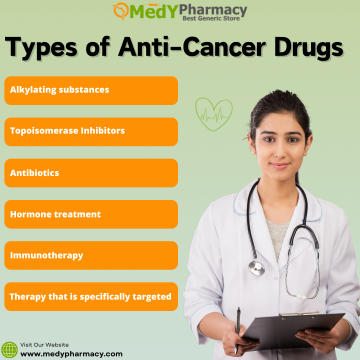
- Alkylating substances
Alkylating substances degrade cell DNA and impede cell division. Nitrosoureas are one type of alkylating agent that can damage cancer cells in the brain, making them useful in the treatment of specific brain tumors.
- Alkylating substances
Antimetabolites can prevent cancer cells from creating the genetic material necessary for cell division and malignant growth.
- Topoisomerase Inhibitors
Topoisomerase inhibitors block DNA replication by inhibiting the action of a topoisomerase enzyme, preventing cancer cells from multiplying.
- Antibiotics
Antibiotics are rarely used to treat infections, but some can be used to treat cancer. These medications disrupt cancer cells’ DNA, preventing them from proliferating and reproducing.
- Hormone treatment
Hormonal therapy is an anti-cancer treatment that targets hormones that play a role in cancer cell proliferation.
- Immunotherapy
Immunotherapy is an anti-cancer treatment that employs the body’s immune system to combat cancer.
- Therapy that is specifically targeted
Targeted therapy is an anti-cancer treatment focusing on specific genes or proteins involved in cancer cell development and dissemination.
Chemotherapy for Cancer Treatment
One of the most important cancer treatment medications is chemotherapy, which administers anti-cancer chemicals. Medical oncologists routinely prescribe chemotherapy in conjunction with other cancer treatments. Certain chemotherapy medications are more successful at killing cancer cells at specific stages of the malignancy, but others may function at any stage.
The exact amount and time of delivering the anti-cancer chemotherapy treatment will be determined by the treating doctor. Because chemotherapy medications target distinct types of cancer cells, combining them can improve therapeutic effectiveness. They are given either alone or with some supporting medications such as Anastronat 1 and Alphalan 2.
Benefits of Anti-Cancer Chemotherapy
Chemotherapy treatments have effectively addressed the difficulties of many cancer patients. Cancers that were formerly thought to be fatal can now be treated with chemotherapy drugs, allowing many patients to live longer lives. Chemotherapy medications can benefit patients in the following ways:
- Get rid of cancer and prevent it from recurring.
- Stop cancer from spreading and enhance your quality of life.
- It reduces symptoms and provides relief from serious illnesses.
Side Effects or Complications of Anti-Cancer
- Hair loss
Anti-cancer medications can damage hair follicles, resulting in hair loss.
- Nausea and vomiting
Anticancer drugs may irritate the stomach and intestines, causing nausea and vomiting.
- Fatigue
Anti-cancer medications can cause fatigue and weakness.
- Mouth sores
Anticancer medications can harm the oral lining, resulting in mouth sores.
- An increased chance of infection
Anticancer medicines can suppress the immune system, increasing the risk of infection.
- Bleeding
Anti-cancer medications can interfere with blood circulation, increasing the likelihood of bleeding.
Distinctions between Targeted Therapy and Chemotherapy Drugs
Targeted therapy typically targets malignant cells while protecting healthy cells. Conventional chemotherapy can cause and destroy cancer cells while also injuring and killing healthy cells.
Targeted therapies hinder cancer cells from replicating and spreading the disease. Conventional chemotherapy also destroys cancer cells.
Anti-Cancer Medicine Effectiveness
Anti-cancer medications are not always effective in curing cancer, but they can help many people live longer and with a better quality of life. The efficacy of anti-cancer medications is determined by the type of cancer being treated, the stage of cancer, and the patient’s general health.
What Are the Different Anti-Cancer Medications?
There are numerous anti-cancer medications, each with a unique mechanism of action. Some medications specifically target cancer cells’ DNA, preventing them from proliferating and replicating. Others target the blood flow required for tumor growth or proteins implicated in cancer cell signaling.
How effective are Anti-Cancer Drugs?
Anti-cancer medications are not always effective in curing cancer, but they can help many people live longer and with a better quality of life. The efficacy of anti-cancer medications is determined by the type of cancer being treated, the stage of cancer, and the patient’s general health.
What Are the Prices of Anti-Cancer Drugs?
The cost of anti-cancer medications varies based on the type of drug, the patient’s insurance coverage, and other considerations.
What Is Anticancer Drugs’ Mechanism of Action?
DNA Damage
Some anti-cancer medications cause DNA damage in cancer cells, preventing them from dividing and reproducing. Doxorubicin, cisplatin, and vincristine are examples of medications that cause DNA damage.
Interfering With Metabolism
Some anticancer medications disrupt cancer cells’ metabolism, stopping them from creating the DNA and proteins required to proliferate. Methotrexate and fluorouracil are two medicines that function by interfering with metabolic processes.
Hormonal Targets
Some anticancer medications target hormones involved in cancer cell proliferation. Tamoxifen and anastrozole are two examples of hormone-targeting medications.
Targeting certain genes or proteins
Some anticancer medications target specific genes or proteins involved in cancer cell development and dissemination. Imatinib and trastuzumab are examples of medications that target specific genes or proteins.
Utilizing the immunological system
Some cancer treatments use the body’s immune system to combat cancer. Ipilimumab and pembrolizumab are two examples of immune-modulating medicines.
What Keeps Cancer Cells from Growing?
- Natural factors
The body contains several natural systems that can help prevent cancer cells from developing. These include the immune system, which can target and destroy cancer cells, as well as apoptosis, which is a type of programmed cell death that aids in the removal of damaged or undesirable cells.
- Factors associated with treatment
Several types of cancer treatments can help stop cancer cells from developing. Surgery, chemotherapy, radiation therapy, targeted therapy, and immunotherapy are all options.
What is the Most Effective Cancer Treatment?
There is no single “most successful” cancer treatment because the optimum treatment for a specific patient depends on the type of cancer, its stage, and the patient’s overall condition.
Some of the most popular and effective cancer therapies include:
- Surgery
- Radiation Therapy
- Chemotherapy
- Targeted therapy.
- Immunotherapy
What is the most difficult type of Anti-Cancer to Treat?
There is no conclusive answer to the question of which cancer is the most difficult to cure, as each patient’s prognosis is determined by a variety of circumstances, including the type of cancer, the stage of disease, and the patient’s overall condition.
However, some tumors are widely regarded as more difficult to treat than others.
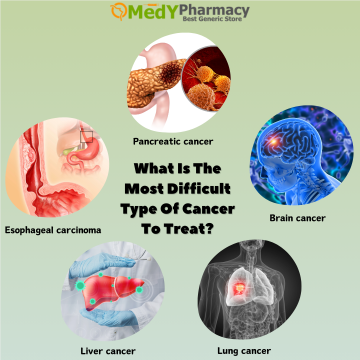
Pancreatic cancer:
Pancreatic cancer is a highly aggressive malignancy that is frequently detected late in the disease’s progression, making treatment difficult.
Brain cancer:
Brain cancer is another aggressive malignancy that is frequently difficult to treat surgically due to the brain’s delicate nature.
Lung cancer:
Lung cancer is the leading cause of cancer death in both men and women, and it is difficult to treat because it commonly spreads to other regions of the body before being detected.
Liver cancer:
Liver cancer is frequently detected late in the disease’s progression, making treatment difficult. It can also be difficult to treat surgically because the liver is a massive organ.
Esophageal carcinoma:
Esophageal cancer is an uncommon cancer, but it is extremely difficult to cure since it is frequently identified late after it has spread to other parts of the body.
Which Anti-Cancer Causes the Most Pain?
There is no conclusive answer to the question of which cancer is the most painful because cancer pain varies widely based on the type of cancer, the location of the tumor, and the patient’s pain tolerance.
- Bone Cancer
- Pancreatic Cancer
- Head and neck cancer
- Brain tumors
- Esophageal cancer
Can Cancer Be Diagnosed Without A Biopsy?
No, cancer cannot be detected without a biopsy. A biopsy is a technique that involves removing a tiny sample of tissue from the body and examining it under a microscope to detect cancer cells.
Conclusion
Anti-cancer medications are an effective tool in the fight against cancer. They can help many patients live longer and with a higher quality of life. Completing Anti-cancer therapy with Bandrone 150 can reduce the risk of liver disease progression. Information Source: Medypharmacy.







